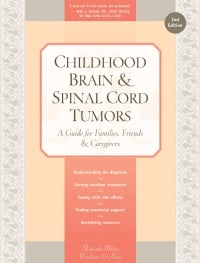Childhood Brain and Spinal Cord Tumors
Using technology to communicate
After the initial contacts have been made, the people in your life will be eager for updates. During those first few weeks of treatment, parents have very little time to chat and often lack the energy to carry on lengthy or meaningful conversations. The nights can be long, however, and nighttime provides an excellent opportunity to use technology to keep people informed about what is happening and how you are feeling.
Many hospitals now have free wireless Internet access (Wi-Fi) in the room, in the parents’ lounge, or in a communal room. Some Internet service providers offer their own Wi-Fi adapters that can be plugged into a laptop to provide access anywhere there is cell phone service. Smartphones and other personal data devices also all have Internet access.
Once connected to the Internet, many options exist for keeping in touch, including Facebook®, Twitter®, and blogs. Some parents establish an email group and send regular updates to the list. One easy way to communicate with your friends and family is to use CaringBridge (www.caringbridge.org), which provides free websites to families and friends of critically ill individuals. Its templates make it easy to set up an attractive site, and the software allows you to add text and photos. Parents, siblings, or the sick child can create journal entries that track the progress of treatment and discuss fears, inspirations, hopes, or needs. There is a guest book where well-wishers can post words of love and encouragement. Finally, you can make the site as public or private as you wish and link your site to other places, such as a blog or Facebook® page. The CaringBridge websites do not have annoying pop-ups or advertisements of any kind.

I was diagnosed at the age of 16 with a low-grade astrocytoma. I’ve had seven surgeries, including shunt revisions, and radiation. I have a large family, and I have a lot of little cousins. When I was diagnosed, I explained everything to them, and they seemed to take it pretty well. Kids can deal with issues like this, better than most adults. My youngest cousin was 5 years old. She has really grown up learning about brain tumors and knowing that her cousin has a brain tumor. She has coped with it, and understands what I have to do to fight this monster. She tells her friends that I’m her favorite cousin and she wants to be just like me! It has drawn us much closer since I was diagnosed, and I believe it is because we did not hide anything from her. We answered the questions she had, and tried to explain everything to her. She knows almost everything that we know about brain tumors, and explains to others the importance of having your brain checked. The way she deals with it makes me laugh a lot of times, and that is what I need.
Table of Contents
All Guides- Introduction
- 1. Diagnosis
- 2. The Brain and Spinal Cord
- 3. Types of Tumors
- 4. Telling Your Child and Others
- 5. Choosing a Treatment
- 6. Coping with Procedures
- 7. Forming a Partnership with the Treatment Team
- 8. Hospitalization
- 9. Venous Catheters
- 10. Surgery
- 11. Chemotherapy
- 12. Common Side Effects of Chemotherapy
- 13. Radiation Therapy
- 14. Peripheral Blood Stem Cell Transplantation
- 15. Siblings
- 16. Family and Friends
- 17. Communication and Behavior
- 18. School
- 19. Sources of Support
- 20. Nutrition
- 21. Medical and Financial Record-keeping
- 22. End of Treatment and Beyond
- 23. Recurrence
- 24. Death and Bereavement
- 25. Looking Forward
- Appendix A. Blood Tests and What They Mean
- Appendix C. Books and Websites

